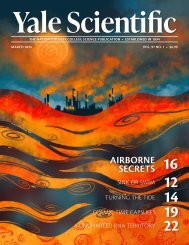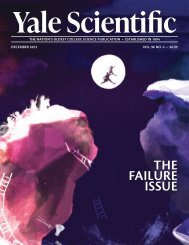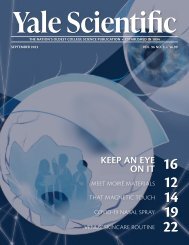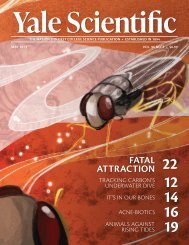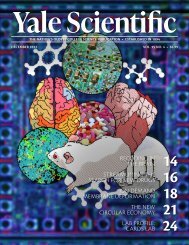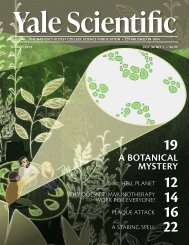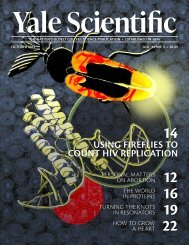YSM Issue 90.4
You also want an ePaper? Increase the reach of your titles
YUMPU automatically turns print PDFs into web optimized ePapers that Google loves.
ALUMNI PROFILE<br />
SANDY CHANG (YC ‘88)<br />
BUILDINGTHENEXTCREATIVETHINKERSINSCIENCE<br />
►BY JESSICA TRINH<br />
Sandy Chang wears a lot of hats. As a professor at the Yale School of<br />
Medicine, he signs out clinical cases and runs an NIH-funded research<br />
lab, studying telomeres and their relationship to cancer and aging. He<br />
holds professorships in the departments of Laboratory Medicine, Pathology,<br />
and Molecular Biophysics and Biochemistry. Last spring, he<br />
was appointed to the role of Associate Dean for Science and Quantitative<br />
Reasoning Education at Yale College, a role that involves overseeing<br />
the quality of STEM education and administration of undergraduate research<br />
fellowships. If that wasn’t enough, he also teaches a popular freshman<br />
seminar called “Topics in Cancer Biology.” For Chang, the time he<br />
invests is worth it, as his top priority is nurturing future scientists.<br />
Born in Taiwan, Chang moved to Sarasota, Florida at the age of seven,<br />
where his love of science blossomed. namored by the vast open skies, he<br />
became interested in astronomy. Despite doing astronomy-related research<br />
in high school as part of his dream of becoming an astronomer,<br />
Chang later found himself drawn toward molecular biology. So, in 1984,<br />
he attended a college well-known for its Molecular Biophysics and Biochemistry<br />
major: Yale University.<br />
While at Yale, Chang pursued a diverse array of interests, from writing<br />
about his undergraduate research for our very own Yale Scientific<br />
Magazine to joining the fencing team. He started conducting laboratory<br />
research during the summer after his first year at Yale. Immediately, he<br />
noticed the lack of funding resources available for undergraduate students,<br />
a problem he would always remember.<br />
Mentorship was key to Chang’s success. During his time in college,<br />
Chang found no shortage of mentors, from undergraduate seniors who<br />
gave him advice on MD-PhD programs to the principal investigators<br />
of research labs who nurtured his love of scientific inquiry. Outside of<br />
class, Chang volunteered in the pediatric oncology department at the<br />
Yale New Haven Hospital, where he engaged with patients. The combination<br />
of volunteer work and scientific research led Chang to realize he<br />
couldn’t just pursue an MD or a PhD degree—he wanted both.<br />
Chang graduated from Yale in 1988 and went on to the prestigious<br />
tri-institutional Weill Cornell/Rockefeller/Sloan-Kettering MD-PhD<br />
program. Afterwards, he did his residency in clinical pathology at the<br />
Brigham & Women’s Hospital and a postdoctoral fellowship at the Dana<br />
Farber Cancer Institute, Harvard Medical School. Chang then moved to<br />
Houston, Texas to start his first real job as an assistant professor at the<br />
MD Anderson Cancer Center. In 2010, Chang received an opportunity<br />
to return to Yale as a tenured associate professor at Yale Medical School.<br />
When it comes to scientific research opportunities for students, Chang<br />
believes in leveling the playing field. He is a firm believer that anyone<br />
who desires to do research should be able to do so, regardless of their<br />
financial obligations. In particular, the First-Year Summer Research Fel-<br />
PHOTOGRAPHY BY SUNNIE LIU<br />
►Between research and serving as Dean of Science and QR, Sandy<br />
Chang still finds plenty of time to mentor undergrads.<br />
lowship provides financial support that enables students to conduct research<br />
under the supervision of a Yale faculty member. The fellowship<br />
includes a stipend that is more than enough to cover Yale’s summer income<br />
contribution, allowing students to focus on their research.<br />
A recent survey of students who completed the fellowship show<br />
promising results: over 91 percent of rising sophomores stated they<br />
would continue research in the future. Chang strongly believes that early<br />
exposure to quality research opportunities is crucial for fostering a<br />
love of science. “The second you find yourself in a research laboratory<br />
with an inspirational mentor who guides you, it’s like being bitten by the<br />
research bug—you fall immediately in love with the research you are<br />
doing,” Chang said. Funding and support from fellowships are just one<br />
important component to building foundations for those interested in<br />
pursuing research—equally important is mentorship.<br />
For instance, Chang was the first-year advisor to Cayla Broton (ES<br />
’16). Following graduation, Cayla spent a year working with Chang,<br />
making important contributions to telomere biology. She is now getting<br />
interviews to top MD/PhD programs. In addition, in his “Topics<br />
in Cancer Biology” course, Chang guides first years through reading<br />
primary research articles and crafting their own research grant proposals.<br />
These are crucial tools that he believes students will utilize long after<br />
they finish the course.<br />
Today, Chang continues to make time for his undergraduates. You will<br />
often find him having meals with students. He loves to teach, to mentor,<br />
and to foster opportunities for undergraduates to be bitten by that research<br />
bug. “It’s a privilege to help students and to watch them blossom<br />
into scientists,” Chang said.<br />
www.yalescientific.org<br />
October 2017<br />
Yale Scientific Magazine<br />
37




